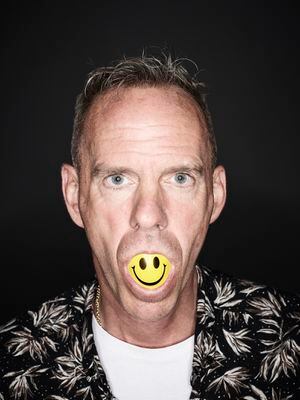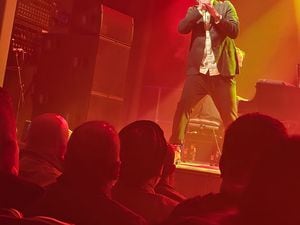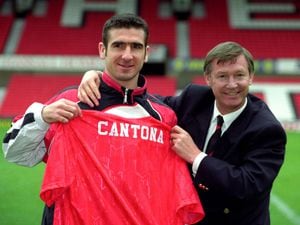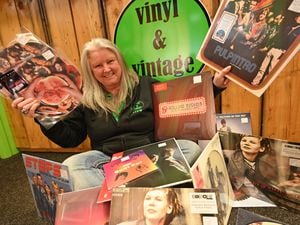Slim chance of DJ slowing down: Fatboy Slim talks ahead of Birmingham show
He’s as lively in person as he is on the stage. Fifteen minutes with Norman ‘Fatboy Slim’ Cook is like rockin’ out on The Rockerfeller Skank, Praise You, Gangster Trippin’ and Going Out Of My Head. But then perhaps that’s not surprising. For one of the joys of a Fatboy Slim gig has always been his interaction with the crowd.

The man who made his name as the geeky bass player with 1980s indie combo The Housemartins was ever thus. A gregarious extrovert, he’s ever been one of the nation’s most engaged performers. So chatting with Norman about his forthcoming arena gig at Birmingham Arena on February 22 – yes, it’s a Friday night, boom – is almost as enjoyable as losing it on the dancefloor.
Personable and chatty, charming and funny, irascible and energetic; Norman might not be wearing his Hawaiian shirt today, but his conversation is equally colourful.
His Birmingham gig looms large in the diary. Put simply, he can’t wait to bang out the tunes at Birmingham Arena, with guest DJs Cousn & Hannah Wants. The show is part of a bigger tour that has taken in New Zealand, Australia and the rest of the UK. And soon, Norman will fly to Spain, the Faroe Islands and other far flung places.
“I’m looking forward to the tour. It’s a bit of a departure for me. I don’t normally do shows like this because I tend not to play in arenas. But we’ve worked out a way of doing big shows that feel intimate and sexy and vibey. Those are qualities that you wouldn’t normally associate with arenas but We. Have. A. Plan.”
Rather than sticking Norman at one end of the room – as promoters would a rock band – they’ll put him in the centre. Fans will be dancing round Mr Cook, therefore, rather than their handbags.
“It’s not rocket science. But we’re just changing things around. We’ve got the extra budget when we play in arenas so we can create something special. We do a lot of shows on beaches and you’re always limited with those by the weather and wind.
“But with this, the basic idea was how we could make a cavernous exhibition hall feel like a nightclub or party. So we play in the round, in the middle, then everyone feels as though they’re in the centre of the party.
“The crowd aren’t watching a stage, as they would a normal gig. Everything is happening in the same area. Everything graduates to the centre but you can move around and see it from every angle.”
The biggest fun, however, isn’t from watching Norman play a mixed bag of tunes. It’s from watching Norman interact with the fans. He’ll be mixing it up and getting involved with the audience as his followers enjoy the best night of the year.
“There’s a lot of fun to be had in my interaction with the audience. The show is all about that relationship with the audience, really. It’s all based on stupidity, raving and tomfoolery. So the key to these shows is to get the best bits out of being in a big arena without it feeling like we are in one.”
Some things will stay the same. There’ll still be students selling over-priced Coca Cola and inedible burgers and hot dogs. But Fatboy and his team have done what they can to turn a cavernous, concrete indoor space into something resembling a nightclub.
“We couldn’t get rid of the concession stands but we’ve done our bit around the fringes of the room so that it feels like a club. We’ll have rave booths where people can get their faces sprayed yellow and we’ll be putting as much in the foyer as we can, so that it starts from the moment they arrive.”
Norman Cook is 55. He was a Grammar School boy in Reigate and played drums in Disque Attack, a British new wave-influenced rock band. When frontman Charlie Alcock was told by his parents that he had to give up the band to concentrate on his O levels, Cook took over as lead vocalist. At The Railway Tavern in Reigate, Cook met Paul Heaton, with whom he formed the Stomping Pondfrogs.
The pair remained friends and after Cook went to Brighton Polytechnic to read a BA in English, politics, and sociology, where he achieved a 2:1 in the British Studies honours course, he furthered his musical ambitions.
He continued to DJ on the thriving Brighton club scene, regularly appearing at the Brighton Belle and the students’ favourite The Basement, where he became known as DJ Quentox. DJs couldn’t earn a living from music, however, and so in 1985 Heaton asked him to join a guitar band called The Housemartins. Their bassist left on the eve of their first national tour, so Cook agreed to move to Hull to join them. The band soon had a hit single with Happy Hour, and their two albums, London 0 Hull 4 and The People Who Grinned Themselves to Death, peaked in the Top 10 of the UK Albums Chart.
It all seems like a long time ago. And it all seems utterly remarkable that a man who’s only a decade or so away from collecting his bus pass and state pension is still living it large and creating the best party in town.
There are many reasons for Cook’s longevity. But perhaps the most important of all is his connection with his audience. He’s able to read a crowd and orchestra the sort of collective hysteria that you’d normally only get on a New Year’s Eve.
“Over the years I’ve had lots of times to think about what I do, especially at my age. You know, the concept of playing records and then this magical thing happening where everybody loses it. For me, it’s about collective euphoria. If you put enough people in a room who are like-minded and want to escape from reality, you’ll create a togetherness. It’s a bit like a political rally or a religious event. With that many people present, the whole thing becomes very powerful. It’s more powerful than the sum of its part. Everyone wants to lose their mind and escape and be in a crazy, sexy, loony world where anything is possible. That’s the basis of the genre. We use loud music and the lights to take people away. But there’s also something that happens within the crowd that’s very powerful.”
And after being swept away, how does the 55-year-old raver come down from the ceiling? Is he off to another club so that he can party until dawn – as he famously did for many years?
Norman laughs. “At my age, it doesn’t take long to come down at all. I don’t have any stimulants any more. As soon as the adrenalin wears off, I’m absolutely shattered. On stage, I have a mental age of 17. When I come off, I remember how old I am and all the things I did to myself at the time that I was on the stage. But I’ve been doing this long enough to know how to switch off. These days, I just have a cup of tea afterwards and read a good book, then I fall asleep. My previous partying lifestyle wasn’t ever going to be sustainable.”
Nights as good as an evening at a Fatboy Slim concert don’t come about by accident. He’s not simply a great MC who puts it down to luck and good fortune. Nor is Norman interested in playing the same old tunes year in and year out – though some classic bangers are never far away from the decks. These days, Norman spends the equivalent of a full month, 24/7, listening to new tunes.
“I spend two hours a day listening to the new tunes I’ve been sent. I trawl the net. That’s part of my job. In this day and age where technology does a lot in terms of mixing the tunes and creating streaming services that predict what you want to hear, the one bit that the robots can’t replace is the choice of tunes when you play a show. So I do untold hours of piling through the rubbish records so that the audience doesn’t have to. The biggest part of my job is quality tunes so they don’t have to listen to the rubbish. And the genius, if it exists, is playing the right tune at the right time.”
Which is something Cook has been rather good at for 20-odd years.
“For the arena shows, we only have a certain kind of tune that works because the room is so big. You know, you can’t wander off in a minimalist noodle or go all jazz. But I only ever know the first two tunes and the last two tunes. “Everything else is a meander dictated by the crowd…. hence there’s loads of hand signals for the crew so they know what I’m going to play next.”
Cook adopted the pseudonym Fatboy Slim in 1996 and his second solo album, Better Living Through Chemistry, featured the Top 40 UK hit Everybody Needs a 303. His next single The Rockafeller Skank was released in 1998 while Praise You gave Cook his first UK solo number one. Preceding that, of course, and following his successful stint in The Housemartins, was his work with Freak Power and Beats International
“The progression to this was gradual. I started as a DJ but back then white people didn’t like dance music. So I thought my journey was to be in a white suburban indie band. But my first love was always DJing. After The Housemartins, it was a slow climb to this. Freak Power was still a band that played music. And Beats was one step on; it was a studio band.
“By the time I created Fatboy Slim, I’d graduated back to the music I loved. Things have changed. Now white people can make this type of music without having to pretend to be black. It probably took me 15 years to work out I’m a much better DJ than guitarist or bassist. When I started, DJing was a hobby for train-spotting vinyl junkies. Now it’s a career. I have to say, I’m happy to have retired my bass guitar.”
Norman travels the world and there are a small number of go-to countries where he can always be sure of a good audience. He loves South America and spends a lot of time in Brazil. “There’s a passion and an abandon and a love of partying down there. Australia and Japan get me too. And there’s little pockets of clubs that are great.
“I guess Ibiza is my main love and Glastonbury too. I go to both year after year. Glastonbury has changed a lot. But I’m not one of those moany old sods who wishes it was like it used to be. I think most of the changes have been for the better.”
He’s worked with some of the biggest names in the business. There was a notable collaboration with the remarkable Scottish-American artist David Byrne as well as projects with Iggy Pop and Bootsy Collins.
“Working with David Byrne was the greatest thrill. I had no knowledge of musicals or anything like that when he called. But when David Byrne phones, you say yes and work out the details afterwards. That made me do something that wasn’t on my bucket list and David was inspiring and funny and nurturing.
“David, Iggy Pop and Bootsy Collins were my holy trinity. After those, I’m happy to retire my collaboration career. Iggy exceeded all expectations and we’d be sitting there grooving with him and he’d be stomping his foot on the floor. He stomped so hard that he eventually put his foot through the floorboard.
“Bootsy was amazing. He’s this big, 7ft tall black man from Minneapolis and after we worked together he told me we were cut from the same cloth.”
Norman invited Bootsy and his wife to stay at his home. And he learned much from the soul and disco legend, who rose to prominence with James Brown in the early 1970s, and later with Parliament-Funkadelic.
“He was talking about Bootszilla. He was saying Bootszilla was a different person to him at home. He said: ‘When I put on the glasses, that’s when I know I’m Bootsy’. It’s the same with me. When I put on the Hawaiian shirt I go from Norman Cook to Fatboy. I become this comic book version of myself – I keep it when I need it but I still live a normal life. Bootsy was an inspiration. He taught me a lot of stuff.”
But while Bootsy was an inspiration, the biggest inspiration of all is Norman’s crowd. They’re the ones who fuel the fire, the ones who get him excited when it’s showtime.
“I don’t go more than two weeks without a show. I need to keep that connection. I just love watching people losing themselves to dance. One person in the crowd having the night of their lives and forgetting about how much they hate their partner, their job or their life is why I do it. It’s my favourite film. Watching people lose their inhibitions is the best thing I could possibly every do.”




